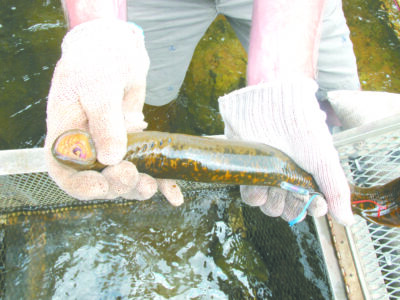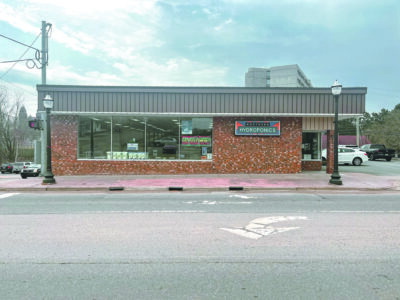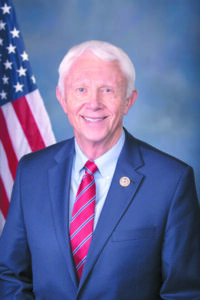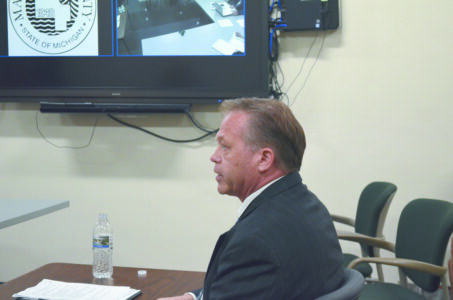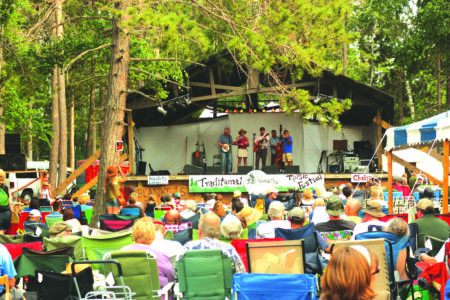Highlighting U.P. assets: Gilchrist visits U.P. for sled dog fest, listening tour

Northern Michigan University President Brock Tessman, left, meets with Lt. Gov. Garlin Gilchrist II during Friday’s Festival of the Sled Dog on Washington Street in Marquette. The festival replaced the UP200 Powered by NMU, Midnight Run and Jack Pine 30 sled dog races, which were canceled due to weather. (Journal photo by Christie Mastric)
By CHRISTIE MASTRIC
Journal Staff Writer
MARQUETTE — The belief that the Upper Peninsula can leverage outdoor recreation and high-speed internet service to help the region were two topics addressed by Lt. Gov. Garlin Gilchrist II as he made stops in the region over the weekend.
Gilchrist visited Friday’s Festival of the Sled Dog in downtown Marquette, which replaced the UP200, Midnight Run and Jack Pine 30 after those races were canceled due to weather.
“I think that pivot is, frankly, just what we do in Michigan,” Gilchrist said of the festival. “We figure out a way to make things work.”
However, Gilchrist said he wanted to celebrate the “amazing” outdoor and economic activity happening in the Upper Peninsula, with outdoor recreation providing $10 billion to the Michigan economy annually. He and Gov. Gretchen Whitmer are searching for ways to “double down” on growing that figure.
Supporting creative entrepreneurs is another way, he noted, but natural features can attract visitors.
“Michigan has such amazing natural resources, such amazing opportunities for a great more,” he said.
Those natural resources, Gilchrist pointed out, are some of the drivers of so much interest in the U.P.
“Making sure we’re good stewards of those is critically important,” he said.
“They can be leveraged for outdoor economy initiatives that we really want to invest in more deeply as a state.”
He said it’s hard to pin down the biggest outdoor recreation attraction the U.P. has to offer, but aesthetics play a big part.
“We have such amazing natural beauty,” Gilchrist said. “That there is something to do from an outdoor recreation standpoint in every season is perhaps even more true in the U.P. than it is in other parts of Michigan.”
He also stressed that infrastructure for outdoor sports has been supported, including the state appropriating funds for the reopening of Copper Peak, a ski jump near Ironwood touted as the largest ski jump in the Western Hemisphere.
Gilchrist mentioned the UP200 and the Copper Dog 150 sled dog race in Calumet as well as the annual Suicide Hill Ski Jumping tournament, hosted by the Ishpeming Ski Club at the U.P. Nordic Ski Complex, are outdoor recreation events that draw international interest to the U.P.
“We want to make sure when folks come here, they see how amazing Michigan is, and they want to come back for other reasons,” Gilchrist said.
High-speed internet the focus
Gilchrist also visited the Northern Center at Northern Michigan University Saturday as part of the MI Connected Future statewide listening tour.
The Michigan High-Speed Internet Office, which was represented at the event, seeks community input and feedback about internet needs most important to Michigan communities.
Gilchrist said new scenarios are possible when technology moves forward.
“We want everyone in Michigan to be able to experience that,” said Gilchrist, who acknowledged that half a million people still can’t get high-speed internet. “That is a mountain we can climb together.”
Michigan, he said, now has professionals dedicated to ensure people have internet technology, and conversations such as the one held Saturday at NMU will help.
Eric Frederick, chief connectivity officer for MIHI, ndicated that the office’s mission is to create a more digitally equitable state where every resident can use technology to improve their quality of life. This investment is made available through the Broadband Equity, Access and Deployment Program from the Bipartisan Infrastructure Law.
The effort, though, begins with planning, he said.
“The mission of our office is to truly capture the ideas and thoughts and needs of our communities before we draft that plan,” Frederick said.
However, he said that mission goes beyond providing internet service to everyone, which he called “the easy part.”
He also listed some challenges.
“How do we sustain these networks in the long term?” Frederick asked. “How do we make sure everyone has a device to connect to the internet once it’s there? How do we make sure that it’s affordable to them in the long term? How do we make sure that everyone has evolving digital skills, not only for their workforce but for their own use of the internet, whether it’s to continue their education or for telehealth access?”
Highlights of Michigan’s efforts to increase high-speed internet, according to the Michigan Department of Labor and Economic Opportunity, include:
≤ providing 23,048 homes, businesses, and community anchor institutions like schools and libraries with high-speed internet access;
≤ setting a state goal to provide 100% access to high-speed internet and 95% adoption by households during the next five years;
≤ providing high-speed internet access to more than 18,000 homes and businesses, through the Connecting Michigan Communities Grant Program;
≤ leveraging over $700 million in federal funding and signing the Building Michigan Together Plan that invested $249 million to connect more families and small businesses to high-speed internet that meets their needs;
¯ establishing the Office of Rural Development to focus on growing rural economies including through collaborations with MIHI to boost high-speed internet connectivity; and
¯ mapping high-speed internet access in all 83 counties, laying the foundation for an investment of over $1.5 billion in federal broadband funds over the next five years.
Gavin Leach, vice president of finance and administration at NMU, said that in 2017, Northern put together a plan that ultimately became the Educational Access Network, a broadband initiative that now reaches 119 communities throughout the U.P. and several in the Northern Lower Peninsula.
“We want to see it grow,” Leach said. “We want to see everybody in the state have access.”
Christie Mastric can be reached at 906-228-2500, ext. 250. Her email address is cbleck@miningjournal.net.


